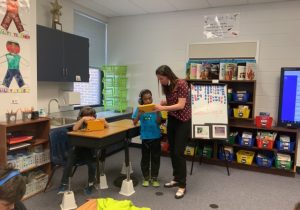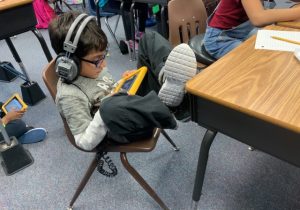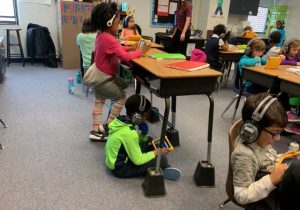Prince William County Schools has been a leading district using Kindle Fires in the classroom. It started about 4-5 years ago. AJ Phillips, then Supervisor of Instructional Technology and William Watts, Instructional Technology Coach at Ellis ES, paved the way for these low-cost devices to be an asset in classrooms. Ranging from $49-$100, these little devices have provided access to quality resources that support student learning.
Whether students are using an interactive reading application or demonstrating their learning using creation/publishing tools, the Kindle gives more students the opportunity to access the resources they need to improve, enhance and extend their learning. They have a very fast login that eliminates the long startup time that often comes with "regular" computers. Students use Clever badges (special QR codes) to quickly log them into Clever to access a variety of applications. For our younger students, this has been a game changer. More time can be focused on thinking, collaborating, communicating or creating instead of staring at a startup screen.
Ms. Sharon Goff, second grade teacher from Lake Ridge Elementary School, has been using Kindle Fires this year in her classroom and has noticed great changes in learning and engagement. The Kindle Fires themselves did not change what happened in her classroom. It was how she changed her instructional practice and learning environment. Because her students have access to quality content, especially digital books, at their fingertips, her team has included digital books as a way to introduce and teach content for all subject areas.
The digital books empower students to read to learn new concepts, not just to learn to read. Her students continually work on reading strategies and skills as they explore new ideas. She feels her students are involved in more meaningful reading this year. They just don't sit in a corner and thumb through pages of a book. The digital content provides scaffolds to help struggling readers and provides opportunities for students to challenge themselves and read more difficult books. Ms. Goff shared that her most struggling readers have made great gains in reading since October.
I had asked Ms. Goff about the difference between this year and last year. She said last year, she would take her students to the library frequently, which took time away from instruction and learning. Now, her students can search for books by topic or genre in her classroom. All students can have access to the same books so they don't have to wait until the book is returned to the library. Ms. Goff stated that having access to these devices allows her to use a variety of assessment strategies using an installed applications that provide her with real time data that she can use right away to address learning needs in her class.
For example, her students draw, use graphic organizers, and write using high quality applications on the device. One of her students shared an activity where he created his own pattern using shapes in a drawing program on his Kindle Fire as part of a math lesson they did earlier in the week. As we were talking, he suddenly got excited and yelled, "Wait, I just thought of something! I can add color to my pattern so the pattern will not just be shapes, but it will be color too! It's another level of my pattern!" Because he had access to a device and tools, he had no barriers and felt empowered and in control of his learning. I think I was just as excited as he was!
It's just not about books. Students also use applications on the devices to explore content through video and use a variety of engaging tools to demonstrate and share their learning. Many students take the devices home to continue their reading and learning. One student shared how much he likes his Kindle Fire and said that every night right after dinner he grabs his Kindle Fire to continue reading. Ms. Goff said her parents are more involved in their child's reading at home.
As I ended my visit with Ms. Goff, she share one last thought with me. She said, "I have never seen the level of engagement with an entire class being on task."
Written by Diane Harazin. Diane is the Supervisor of Instructional Technology for Prince William County Public Schools and a member of the VSTE Board of Directors.




 Krystle Demas from Goochland County is a model coach, an approachable expert who is always learning and always leading. She routinely uses her experience and new learning to help both students and teachers be their best. She is regarded by her peers as a compassionate leader who knows the research behind pedagogy, has her finger on the latest tools, and someone who is effective at advancing student growth. Krystle is a valued member of the division technology team and an instructional technology coach.
Krystle Demas from Goochland County is a model coach, an approachable expert who is always learning and always leading. She routinely uses her experience and new learning to help both students and teachers be their best. She is regarded by her peers as a compassionate leader who knows the research behind pedagogy, has her finger on the latest tools, and someone who is effective at advancing student growth. Krystle is a valued member of the division technology team and an instructional technology coach. Patrick Hausammann from Clarke County Public Schools is a vital member of the learning community in Clarke County and around the state. His work with teachers has allowed many to step outside their comfort zones and find innovative approaches to meet student needs. As one of the co-founders of EdcampNSV and as the driving force/founder of the Clarke County Innovation Committee and Conference, he has demonstrated a commitment to helping teachers learn in order to help students. His acceptance into the Google Innovators Program -- an extremely selective group -- epitomizes his growth-mindset and collaborative personality.
Patrick Hausammann from Clarke County Public Schools is a vital member of the learning community in Clarke County and around the state. His work with teachers has allowed many to step outside their comfort zones and find innovative approaches to meet student needs. As one of the co-founders of EdcampNSV and as the driving force/founder of the Clarke County Innovation Committee and Conference, he has demonstrated a commitment to helping teachers learn in order to help students. His acceptance into the Google Innovators Program -- an extremely selective group -- epitomizes his growth-mindset and collaborative personality.  Timothy Signorelli from Fairfax County Public Schools has helped guide his school’s transition to 1:1 technology opportunities for students and designed meaningful learning experiences for teachers and students alike to pave the way for this change. As a leader, he has thought deeply about the steps needed to achieve success; as a teacher at heart, he brings classroom experience and an understanding of instruction to all that he does. He combines these strengths with an approachable and collegial manner that encourages teachers and students to seek out his support. Tim is generous with his expertise, sharing his time and talents to support professional development in literacy and other school- and district-wide goals in addition to 1:1. No matter the context, Tim provides useful technology resources, meaningful training, and informed guidance in a friendly and professional manner.
Timothy Signorelli from Fairfax County Public Schools has helped guide his school’s transition to 1:1 technology opportunities for students and designed meaningful learning experiences for teachers and students alike to pave the way for this change. As a leader, he has thought deeply about the steps needed to achieve success; as a teacher at heart, he brings classroom experience and an understanding of instruction to all that he does. He combines these strengths with an approachable and collegial manner that encourages teachers and students to seek out his support. Tim is generous with his expertise, sharing his time and talents to support professional development in literacy and other school- and district-wide goals in addition to 1:1. No matter the context, Tim provides useful technology resources, meaningful training, and informed guidance in a friendly and professional manner. 

